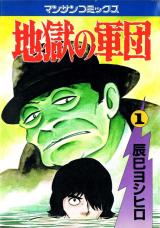This is the first long Yoshihiro Tatsuro manga I’ve read, apart from the brilliant A Drifting Life and the technically, but not narratively, impressive Black Blizzard. This one, though, is a completely different beast. For starters, it’s much longer than either, plus it’s much more fantastical than anything of his I’ve ever read.
The manga takes the perennially popular story of a young person, almost always a man, brought up by animals, and puts a small twist to it. Whereas in most other stories, especially the ones influenced by Tarzan and all other pulps like it, the man is raised by powerful and majestic animals in the jungle, here, the young abandoned child, literally aborted and thrown away at a dingy toilet, is brought up in the city sewers by rats. Naturally, he believes he is one of them and can also communicate with the rodents.
Later, he is discovered by a poor old lady, taught how to speak like a human, and given a human name, Kiki (for the sound rats make, I think), but this is not enough to give him humanity. He still hangs out with the underground rodents and thinks himself as one of them, hating people and the overground society. This brings him on a party of murder, destruction, and crime, driven more by hatred for humanity than anything else.
Even a brief glance from this synopsis shows that this six volume dark crime science fiction is both close to Tatsumi’s other works, but also very different from them. Like his short stories, it is preoccupied with the life of the lowest rungs of society. We see the lives of criminals, low-paid policemen, poor blue collar workers, peddlers, and such. Mostly people who are one way or another, abandoned and ignored by mainstream society, and if they are seen, they are often ridiculed or hurt by it. There is something very wrong with this world in which almost everyone suffers form the nice old woman who raised Kiki to the detective hellbent on destroying him, this Tatsumi manga suggests. The only ones who do not experience difficulties are the rich and untouchable powerful abusers.
Human society lacks the basic desire for collective survival that rats have. Instead, every person tries to destroy and screw over everyone else, all the while hiding behind the mask of civility. In that, Kiki realises that rats and criminals are superior to normal society (rats are better than humans, though, because they are purer in their respect for Kiki’s authority). This, I think, is the reason why he sees people as his enemy and wants to destroy them.
This is a very different manga from Tatsumi’s usual work mainly in its fantastical criminal plots involving epic thefts, use of armies of rats, cryogenic sleep, and superpower-like qualities to the characters in some of the later chapters. Sadly, it is very obvious from early on that Tatsumi isn’t a master of the tropes he uses, because most of the unbelievable things he starts introducing from early on are just slapdash and unimaginative.
Also, the whole thing read more like something written in a bygone era, not the early 80s. I don’t mean visually, but story-wise. As it has probably become clear, it’s very pulpy and at times, random, without almost no logical character development. All the changes in Kiki witnessed by us seem to be cobbled together in the last moment. This is a big problem for a such character-driven story.
Visually, it is pretty beautiful. The characters designs are the typical Tatsumi squarish ones, the backgrounds are grimy, detailed, and evocative. The heavy, thick, super black lines that I have started to equate with his work are also prevalent, while some of the younger female characters are drawn with a bit more delicate brush. Composition-wise, it is nothing special. There are almost no unique page layouts to speak of, and the action is not all that exciting, but, anyway, the Tatsumi’s power isn’t in wowing us with shocking panels or crazy action, but in telling emotionally impactful stories with bold, yet minimalist, strokes.
Sadly, I think that his potential is very much squandered with this work. I am still happy I read it, though.





